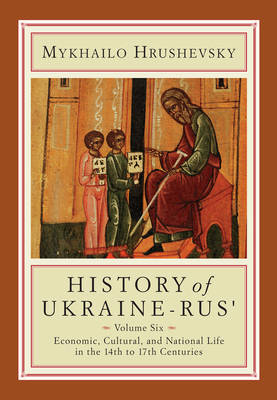
- Retrait gratuit dans votre magasin Club
- 7.000.000 titres dans notre catalogue
- Payer en toute sécurité
- Toujours un magasin près de chez vous
- Retrait gratuit dans votre magasin Club
- 7.000.0000 titres dans notre catalogue
- Payer en toute sécurité
- Toujours un magasin près de chez vous
History of Ukraine-Rus'
Volume 6. Economic, Cultural, and National Life in the Fourteenth to Seventeenth Centuries
Mykhailo Hrushevsky
129,95 €
+ 259 points
Format
Description
Volume 6 of Mykhailo Hrushevsky's History of Ukraine-Rus' focuses on life in Ukraine before the Cossack age of seventeenth century. The volume bears the broadly inclusive and telling subtitle of Economic, Cultural, and National Life in the 14th to 17th Centuries. It depicts life in Ukraine during the transitional Lithuanian-Polish period of its history. Presented here are the master historian's discussion and analysis of economic life, society, political affairs, everyday life, culture, church history, interethnic relations, and national identity in the Ukrainian lands during that time. The volume opens with an account of trade, manufacture, and agriculture in the lands of western Ukraine and the initially less settled lands of central and eastern Ukraine. Relying on a wealth of sources, including statistical and other data, Hrushevsky thoroughly examines the rural economy, tracing developments in agricultural practice and husbandry from Old Rus' times to the expanded grain production, increased corvée, and exhaustive use of natural resources in the late fifteenth and subsequent centuries. He discusses the composition of Ukraine's population and its cultural and national interrelations, with attention to the peasantry, the burgher stratum, the clerical order, the nobility, and the highest echelon of society, the magnates. Hrushevsky's depiction of everyday life includes in-depth information about cultural, religious, and national traditions, education, book and literary production, and artistic creativity. His analysis of social values and norms uses sources ranging from individuals' wills to contemporary accounts of daily life to the religious works of the ascetic Ivan Vyshensky. Topics also treated in depth include the religious lay brotherhoods and the guild system. The latter part of the volume focuses on the origins and development of the ideological, religio-national, and political struggle within the Orthodox Church for and against church union. It includes discussion of the roles of the Catholic Church and the Lithuanian, Polish, and (after 1569) Commonwealth governments. Also discussed are the literary polemics that shaped the struggle over the Union of Brest (1596), including the works of Ipatii Potii, Stefan Zyzanii, and Meletii Smotrytsky. The volume relates the course of the struggle to the first decades of the seventeenth century, when the new phenomenon of Cossackdom was coming to the fore in Ukrainian affairs. Hrushevsky's own bibliographical Notes have been amplified by editor's additions of major works published subsequently. The editorial apparatus also includes a glossary, two maps, a bibliography of works cited by Hrushevsky, two appendixes, and a comprehensive index. Volume 6 was translated by Leonid Heretz, professor of history at Bridgewater State University and a noted specialist of modern Ukrainian history. Dr. Frank E. Sysyn, director of the Jacyk Centre, edited the volume, assisted by Uliana M. Pasicznyk, managing editor. Consulting editor was Myron M. Kapral, director of the Lviv branch of the M. S. Hrushevsky Institute of Ukrainian Archeography and Source Studies and professor of history at the Ivan Franko National University of Lviv.
Spécifications
Parties prenantes
- Auteur(s) :
- Traducteur(s):
- Editeur:
Contenu
- Nombre de pages :
- 692
- Langue:
- Anglais
- Collection :
Caractéristiques
- EAN:
- 9781894865258
- Date de parution :
- 13-09-21
- Format:
- Livre relié
- Format numérique:
- Genaaid
- Dimensions :
- 175 mm x 259 mm
- Poids :
- 1451 g

Les avis
Nous publions uniquement les avis qui respectent les conditions requises. Consultez nos conditions pour les avis.






